The ‘El’ of course refers to Chicago’s elevated train lines and the Chicago rapid-transit system as a whole. I was going to title this post “Riding on the ‘El’ in Chicago”, but after thinking back to my ten months in the city, I realized there wasn’t much actual riding going on. I spent at least 30 minutes waiting for every 10 minutes of riding; and when I say ‘waiting on the El’, I mean both waiting on a platform for a train to arrive and waiting on a train itself as it sits around motionless. Both of those occurred with a shocking frequency.
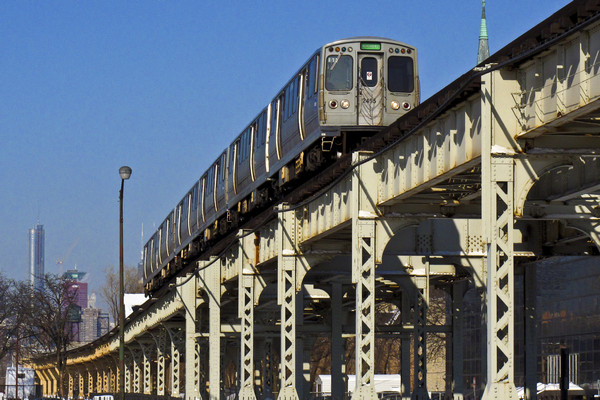
A ‘Green Line’ train on Chicago’s elevated tracks. Photo by John Picken.
The ‘El’ is a vital component of the Chicago experience and undeniably adds to the unique atmosphere of the city, but I don’t think being on time, even occasionally, would change that. While I was living and working in Chicago, commuting to work on the ‘El’ on a daily basis, I was constantly annoyed with the system. It wasn’t until I left Chicago and moved to Japan however, that I realized just how poorly run the CTA (Chicago Transit Authority) really is.
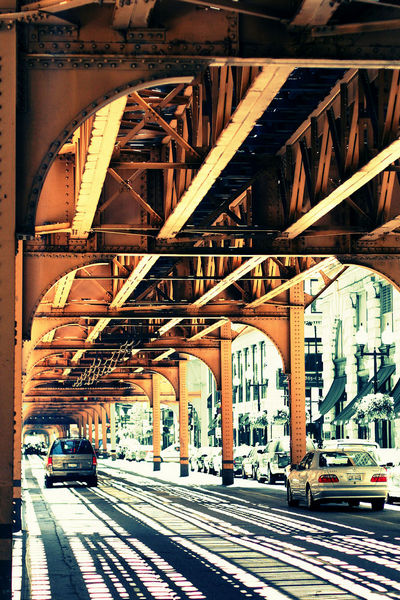
Aside form how poorly run the system is, I actually really like the ‘El’. There’s no question it adds to Chicago’s atmosphere. Photo by milopeng.
Of course it’s unfortunate that I had to move to Japan next, home of the near-perfect on-time record for not only city metro systems, but country-wide trains, where even when there is a delay due to an earthquake or typhoon, the new time of arrival is announced down to the exact minute. How could a city where trains rarely arrive on time—and when they do, it’s because they’re delayed just enough to hit the arrival time of a future train (usually several trains after it on the schedule) entirely by chance—compete with that.
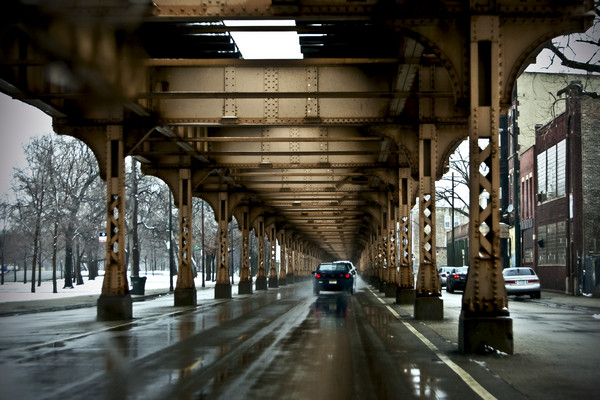
A rainy day below the elevated tracks. Photo by Tau Zero.
I remember so many mornings before work or evenings after work standing on station platforms for 15 to 20 minutes, when trains were scheduled to arrive every two to five. When a train did finally show up, it was naturally completely packed. Of course it was followed in quick succession by five more trains, all of which were mostly empty, but no one could afford to risk waiting for them, since everyone was already late for work by that point.
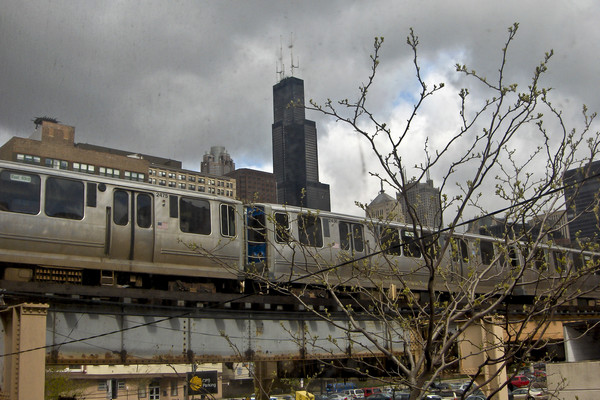
Sears (now Willis) Tower behind a passing ‘El’ train. Photo by Esther Dyson.
Granted, even at their most crowded, trains in Chicago came nowhere near the trains in Tokyo or Shanghai in terms of the number of people stuffed into a tiny metal box, but it was somehow worse. For one, the people were considerably larger. Also, while you have to endure the smell of stale smoke and liquor on Japanese trains and people who haven’t washed in a week or two on Chinese ones, you don’t have the homeless guy who’s been living in the corner of your train car with all his worldly possession (i.e. three bags of cans and a dead cat) for the past two days and who smells like he spent the four days prior to that in a gutter, marinating in a puddle of urine.
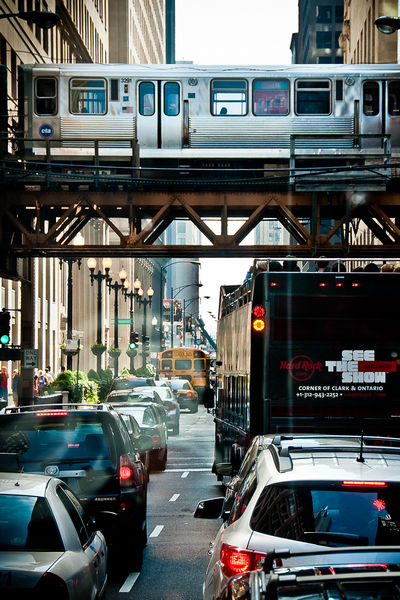
An ‘El’ train in Chicago’s downtown loop. Photo by Ruth Flickr.
These guys aren’t technically allowed to live on the train, but the security guards at the stations are very strict adherents to the motto: “out of sight, out of mind.” I know, a homeless guy loudly dragging three bags of cans behind him as he climbs over the turnstile is hardly “out of sight” when you’re sitting in a booth two meters away, but luckily you can smell these guys the second they hit the first step into the station, giving the guards ample time to be anywhere else.
Similarly, the guards seem to have a hard time hearing the guys who sit on the underground platforms maniacally beating upturned empty paint buckets with all their strength, in an attempt to make even the scheduled two-minute wait unbearable, much less the inevitable twenty minute wait due to delays. These ‘musicians’ also aggressively collect money to compensate themselves for performing this service, which is most likely illegal too. Guess who fails to notice.
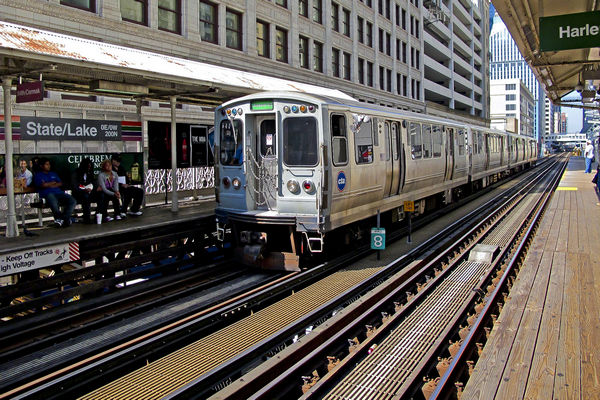
A green line train pulling into a station downtown. Photo by phil_tip.
The guards even manage to contribute to the delays themselves. Chicago trains are not equipped to handle handicapped people, so the guards are expected to help them onto the train by providing a ramp. You can probably guess that the guards are almost always occupied and nowhere to be found when a handicapped person shows up, meaning the driver has to get out and set up the ramp. While he’s off the train, he’ll often take a quick restroom break and maybe go do some grocery shopping or hit up a local bar, before resuming his route.
Now I know people will think it’s only ten or twenty minutes and you can really just suck it up and wait. Well, until you’ve gotten off work late in the dead of a Chicago winter and spend twenty minutes on an elevated outdoor platform in temperatures far below zero waiting for a train that will likely never arrive since it has now frozen to the track, you should hold off on that thought. And if that doesn’t sound bad enough, just wait until the icy winds start blowing in off the lake.
I see the “El” in Chicago isn’t much fun 😉 It reminds me a lot of Chinese train 😛
Actually, as a tourist in Chicago, the “El” would probably be quite a nice way to see the city, as long as you’re not in any hurry. It’s when you live there and you have to rely on it to get you somewhere on time, that it becomes annoying.
I’m just happy to see ANY public transportation in America. I would take a horribly-run El in Austin any day…
Yeah, I always hated that in Seattle too. If you don’t have a car, you basically stay home.
I’m curious what particular line and stop you had problems with. I know that was two years ago but I often use the Rockwell stop of the Brown Line and it seems to be fine. I am fairly new here though but have found that there are phone apps that the CTA manages so you know exactly when trains are due as well as the next one.
The main stations I waited at were Clark/Division (red line) in the morning and Quincy (loop) at night. This was actually far more than two years ago. I was living in Chicago in 2002/2003, before most people had cell phones and long before “app” was even a word.